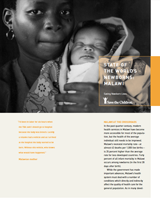
In the past quarter century, modern health services in Malawi have become more accessible for most of the population, but the health of the average individual still needs to be improved.
Malawi’s neonatal mortality rate—at almost 42 deaths per 1,000 live births— is 35 percent higher than the average rate for less developed countries. Forty percent of all infant mortality in Malawi occurs among newborns (in the first 28 days after birth).
While the government has made important advances, Malawi’s health system must deal with a number of conditions which directly and indirectly
affect the quality of health care for the general population. As in many developing countries, more work still needs to be done in the areas of management and supervision, in making the best use of scarce resources, providing more incentives for health personnel, and enhancing institutional capacity for planning and deployment—key issues affecting health care delivery and other health indicators.
Although Malawi has many dedicated and talented health professionals, enrollment in medical and nursing programs is declining, and some health care workers suffer from low morale. The general public, meanwhile, needs to become better informed
about health matters so they can take better care of themselves and ask for professional help when needed. Needless to say, the impact of the HIV/AIDS epidemic has complicated the government’s efforts in many of these areas.